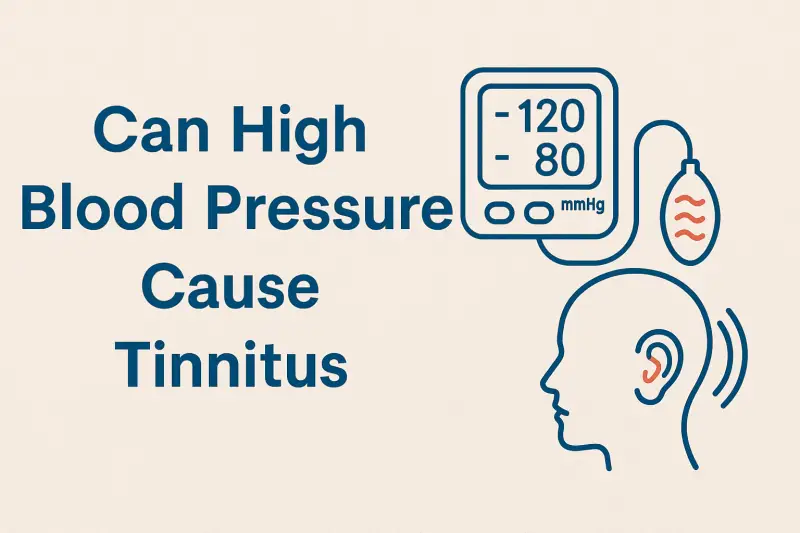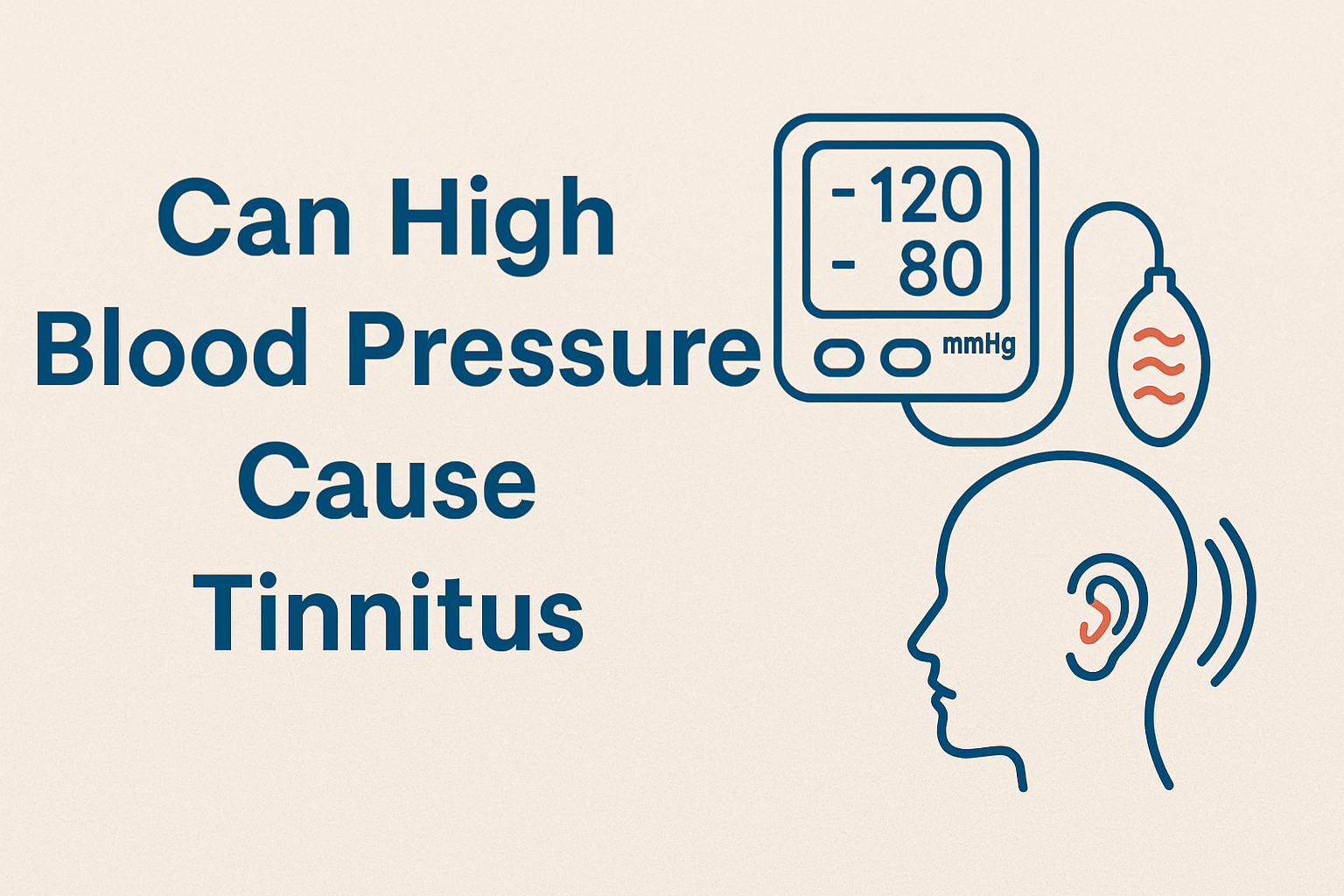Tinnitus—the constant or intermittent ringing, buzzing, or hissing in the ears—can be an incredibly frustrating experience. While it can stem from a variety of causes, one of the lesser-known but medically significant links is between tinnitus and high blood pressure (hypertension).
High blood pressure doesn’t just affect the heart and arteries—it can also influence how blood flows through the delicate structures of the inner ear. This connection raises an important question for many people suffering from tinnitus: Can high blood pressure really cause or worsen tinnitus?
Let’s explore the science, symptoms, causes, and management strategies behind this complex relationship.
Understanding Tinnitus

Tinnitus is not a disease itself but a symptom of an underlying condition. It refers to the perception of sound—such as ringing, roaring, humming, or whooshing—when no external sound source exists.
The sounds can vary in pitch and intensity, and they may affect one or both ears. Some people describe it as a faint background noise, while others experience it as a loud and persistent sound that disrupts daily life.
Tinnitus is generally categorized into two main types:
- Subjective tinnitus: Only the affected person can hear the noise. This is the most common type and is often linked to hearing loss or damage in the auditory pathway.
- Objective tinnitus: The sound can actually be detected by a doctor during an examination. This rare form is usually related to vascular or muscular issues within the ear.
How High Blood Pressure Affects the Body
To understand how high blood pressure (hypertension) might cause tinnitus, it’s essential to know what hypertension does inside the body.
High blood pressure means the force of blood pushing against your artery walls is consistently too high. Over time, this pressure can damage blood vessels, reducing their elasticity and making it harder for blood to circulate smoothly.
When this happens in sensitive areas—such as the brain, eyes, and inner ear—the effects can be more noticeable. The inner ear, in particular, relies on a steady supply of oxygen-rich blood. Any fluctuation or turbulence in that blood flow can disrupt hearing and balance functions.
The Connection Between High Blood Pressure and Tinnitus
How Blood Pressure Impacts Ear Function
The ear is supplied by a network of tiny blood vessels that ensure the hair cells in the cochlea (the hearing organ) receive adequate oxygen and nutrients. When blood pressure rises, these fragile vessels can become strained or even damaged.
This can lead to:
- Reduced oxygen delivery to inner ear cells, impairing their ability to transmit sound signals accurately.
- Turbulent blood flow, which can cause pulsatile tinnitus—a rhythmic, heartbeat-like sound in the ear.
- Increased intracranial pressure, influencing the auditory nerve pathways.
Pulsatile Tinnitus: A Key Indicator
Unlike regular tinnitus, pulsatile tinnitus often has a direct connection with vascular conditions like hypertension. People with this condition typically describe hearing a rhythmic “whooshing” sound that syncs with their heartbeat.
This form of tinnitus can be a red flag, suggesting that blood flow near the ear or within the head is not normal. While not always dangerous, it may signal underlying vascular issues that require medical attention.
Scientific Evidence Linking High Blood Pressure to Tinnitus
Several studies have explored this relationship, with many showing a clear correlation between hypertension and tinnitus prevalence.
For example, a study published in the American Journal of Otolaryngology found that individuals with hypertension were significantly more likely to report tinnitus than those with normal blood pressure. Researchers believe that elevated pressure can damage the cochlear microcirculation, affecting hearing perception.
Moreover, high blood pressure often coexists with other conditions—like atherosclerosis (plaque buildup in arteries) or diabetes—which can further impair circulation to the auditory system.
While hypertension doesn’t directly cause tinnitus in every case, it can certainly exacerbate or trigger it in individuals already vulnerable due to other risk factors.
Other Circulatory Problems That Can Cause Tinnitus
It’s worth noting that hypertension is not the only vascular condition that can contribute to tinnitus. Other related issues include:
- Atherosclerosis: Hardening of the arteries can narrow the vessels supplying the ear, causing pulsatile tinnitus.
- Arteriovenous malformations (AVMs): Abnormal connections between arteries and veins in the brain or ear region can alter blood flow patterns.
- Venous sinus stenosis: Narrowing of the venous drainage pathways can produce rhythmic tinnitus sounds.
These conditions share a common factor—disrupted or turbulent blood flow, which can easily translate into audible sensations perceived as tinnitus.
Symptoms That May Indicate a Blood Pressure Connection
If your tinnitus is linked to high blood pressure, you might notice certain accompanying symptoms such as:
- A pulsing or whooshing sound in the ears, especially when lying down.
- Headaches or dizziness, often linked to fluctuating blood pressure.
- Chest tightness or shortness of breath when the heart is under strain.
- Visual disturbances, like blurry vision or flashes, due to blood vessel changes.
- Neck or head pressure, which may worsen the ear noise.
Recognizing these warning signs can help you and your healthcare provider identify whether your tinnitus is vascular in origin.
Who Is Most at Risk?
Not everyone with hypertension will experience tinnitus. However, certain individuals are more prone to it.
Age and Hearing Loss
As people age, the risk of both hypertension and tinnitus increases. Age-related hearing loss can make the ears more sensitive to changes in blood flow, amplifying tinnitus symptoms.
Lifestyle Factors
Smoking, excessive alcohol consumption, obesity, and a high-sodium diet can contribute to both high blood pressure and tinnitus. People with these risk factors are more likely to experience both conditions simultaneously.
Underlying Health Conditions
Conditions such as diabetes, thyroid problems, and chronic kidney disease can also increase the risk of developing tinnitus in conjunction with hypertension.
Can Lowering Blood Pressure Reduce Tinnitus?
The good news is that in some cases, managing blood pressure effectively can lessen tinnitus symptoms. When blood flow becomes more stable, the turbulent noises within the ear may fade or become less noticeable.
Lifestyle Modifications That Help
- Reduce sodium intake: Salt directly raises blood pressure. Limiting processed foods can help stabilize it.
- Exercise regularly: Physical activity improves circulation and reduces vascular stiffness.
- Avoid tobacco and excess alcohol: Both can damage blood vessels and worsen tinnitus perception.
- Maintain a healthy weight: Even modest weight loss can lead to measurable blood pressure improvement.
- Manage stress: Chronic stress raises cortisol levels, indirectly affecting both blood pressure and tinnitus intensity.
Medication Management
Certain antihypertensive medications can improve blood flow and protect blood vessels in the ear. However, some drugs—such as loop diuretics or high doses of aspirin—can actually worsen tinnitus.
Therefore, it’s crucial to work closely with your healthcare provider to choose the right combination of treatments.
How Doctors Diagnose Hypertension-Related Tinnitus
When tinnitus is suspected to be linked to high blood pressure, doctors usually take a comprehensive approach.
Physical and Medical History Examination
Your doctor will assess your blood pressure readings, ask about your lifestyle, and check for related symptoms such as dizziness or headaches.
Hearing and Imaging Tests
- Audiogram: Measures hearing ability and detects any related hearing loss.
- MRI or CT scan: Helps visualize the ear and brain structures to rule out other vascular or neurological causes.
- Doppler ultrasound: Can detect abnormal blood flow in the neck or head arteries.
These diagnostic tools help differentiate between tinnitus caused by hypertension and other ear-related issues such as infection or nerve damage.
When to Seek Medical Help
You should always consult a healthcare professional if you experience sudden-onset tinnitus, especially if it’s accompanied by:
- One-sided hearing loss
- Pulsatile or rhythmic tinnitus
- Severe headaches or blurred vision
- Chest pain or shortness of breath
- Dizziness or fainting spells
These could indicate an underlying vascular or neurological emergency, such as a hypertensive crisis or a circulatory disorder requiring immediate attention.
Can Tinnitus Be Permanent If Caused by High Blood Pressure?
Whether tinnitus becomes permanent depends on how long the hypertension has been uncontrolled and how much damage has occurred to the auditory system.
If high blood pressure is addressed early, and blood flow returns to normal, tinnitus may diminish over time. However, prolonged hypertension can cause irreversible cochlear damage, making the ringing a chronic condition.
This is why early detection and consistent blood pressure management are critical in preventing long-term auditory complications.
Tips for Managing Tinnitus Alongside Hypertension
1. Follow a Heart-Healthy Diet
Adopt a diet rich in fruits, vegetables, whole grains, lean proteins, and healthy fats. The DASH (Dietary Approaches to Stop Hypertension) diet is especially beneficial for reducing blood pressure and promoting overall vascular health.
2. Control Caffeine and Salt Intake
Both caffeine and sodium can exacerbate tinnitus by affecting circulation and nerve sensitivity. Reducing these can significantly improve your ear health.
3. Practice Relaxation Techniques
Meditation, deep breathing, and yoga help lower stress, which in turn reduces both hypertension and tinnitus perception.
4. Get Adequate Sleep
Sleep disturbances can worsen both blood pressure and tinnitus severity. Aim for 7–8 hours of uninterrupted rest per night.
5. Avoid Loud Noise Exposure
Prolonged noise exposure damages hair cells in the inner ear, compounding tinnitus symptoms. Use ear protection in noisy environments.
Alternative and Supportive Therapies
While medical treatment is essential, some people find relief through supportive approaches:
- Sound therapy: Low-level background noise can mask tinnitus sounds and promote relaxation.
- Cognitive Behavioral Therapy (CBT): Helps patients manage the emotional impact of chronic tinnitus.
- Biofeedback: Trains patients to control stress-related body responses, indirectly helping blood pressure and tinnitus.
- Acupuncture: Some individuals report symptom relief, though scientific evidence is mixed.
These approaches are best used alongside—not instead of—medical management.
Preventing Tinnitus from Hypertension
Prevention is always better than treatment. Maintaining healthy blood pressure through balanced habits greatly reduces the risk of tinnitus and other vascular complications.
Focus on these long-term preventive strategies:
- Regular blood pressure monitoring
- Annual hearing evaluations
- Maintaining cholesterol and glucose levels
- Avoiding smoking and limiting alcohol
- Staying physically active daily
By keeping your cardiovascular system strong, you can protect your ears from potential vascular stress.
Living with Hypertension and Tinnitus
Living with both conditions can be challenging, but many people successfully manage them through lifestyle discipline and medical support.
Using sound enrichment devices, joining tinnitus support groups, and tracking blood pressure trends can all make a difference. Most importantly, consistency in treatment is key—skipping medications or neglecting checkups can worsen both tinnitus and hypertension over time.
Final Thoughts
So, can high blood pressure cause tinnitus? The answer is yes—it can, particularly in the form of pulsatile tinnitus or when blood vessel damage affects the ear’s delicate structures.
However, hypertension-related tinnitus is often manageable and sometimes reversible if addressed promptly. By controlling blood pressure through lifestyle changes, medication, and regular monitoring, you can protect your hearing and reduce tinnitus intensity.
If you suspect your tinnitus is connected to high blood pressure, seek professional medical advice rather than self-diagnosing. The right diagnosis and treatment plan can dramatically improve both your ear health and cardiovascular well-being.
Disclaimer: This article is for informational purposes only and should not replace professional medical advice. Always consult your healthcare provider for diagnosis or treatment if you experience tinnitus or suspect high blood pressure.



